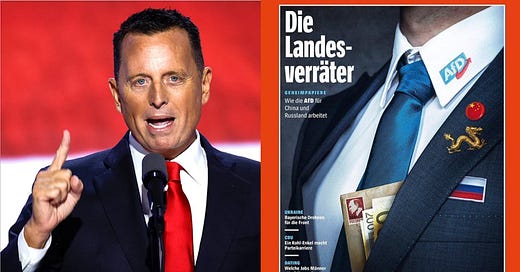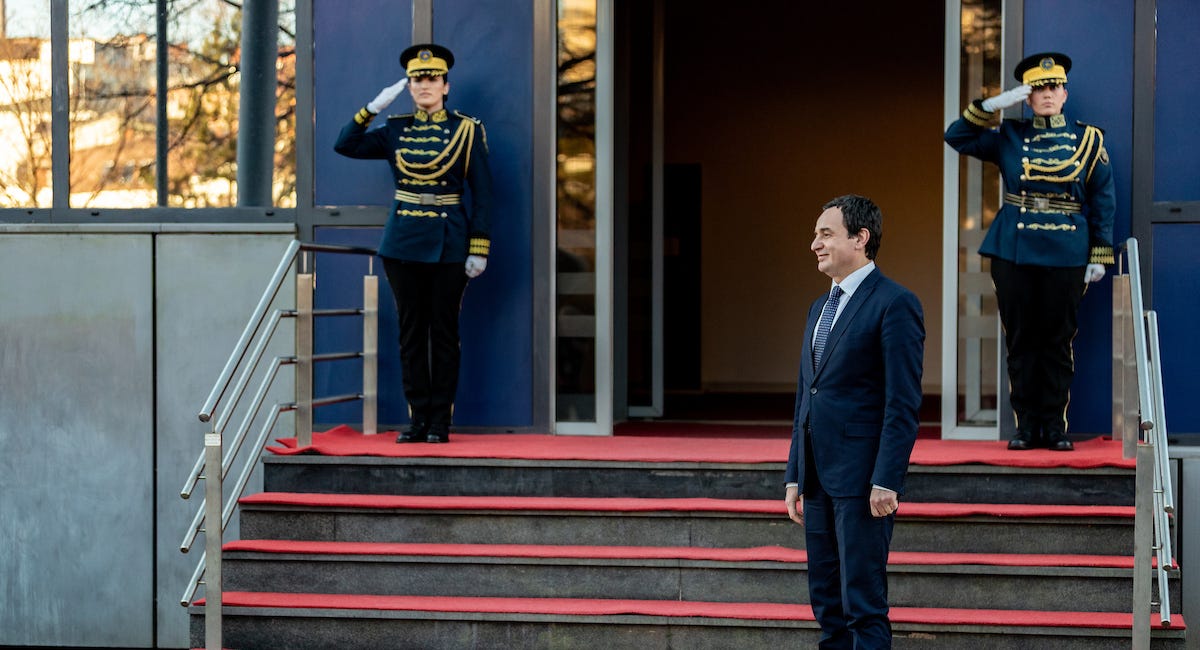Kosovo in Crisis: Is Grenell Engineering Another Political Coup?
From diplomacy to disinformation, Grenell resurfaces, fuelling chaos in Kosovo’s elections with the same tactics that toppled Kurti’s government in 2020.
The year is 2025, and Richard Grenell, a figure whose diplomatic career has been marked by controversy, deception, and a pattern of political manipulation, has once again resurfaced in the Kosovo political landscape. His latest move, a tweet attacking Kosovo’s Prime Minister Albin Kurti, echoes a familiar strategy, one previously dissected in a European Parliament report from February 2021. This report, based on information gathered throughout 2020, meticulously documented how Grenell orchestrated the downfall of Kurti’s first administration through a manufactured crisis and disinformation campaign. Five years later, the playbook remains unchanged: leverage misinformation, exploit personal political ties, and undermine democratic institutions to serve narrow geopolitical interests.
In early 2020, as outlined on pages 25 and 26 of the European Parliament report titled Mapping Fake News and Disinformation in the Western Balkans and Identifying Ways to Effectively Counter Them, Grenell engineered a crisis that culminated in the collapse of Kurti’s government. Frustrated with Kurti’s refusal to acquiesce to a rushed settlement with Serbia that favoured U.S. electoral interests over Kosovo’s sovereignty, Grenell manipulated the narrative by having Donald Trump Jr. and Senator David Perdue tweet about withdrawing U.S. troops from Kosovo. These statements, though not official U.S. policy, were then used by Grenell to pressure Kurti’s coalition partners into supporting a no-confidence vote, toppling the government1. The maneuver was widely condemned across Europe, with French and German diplomats openly criticising Grenell’s interference2.
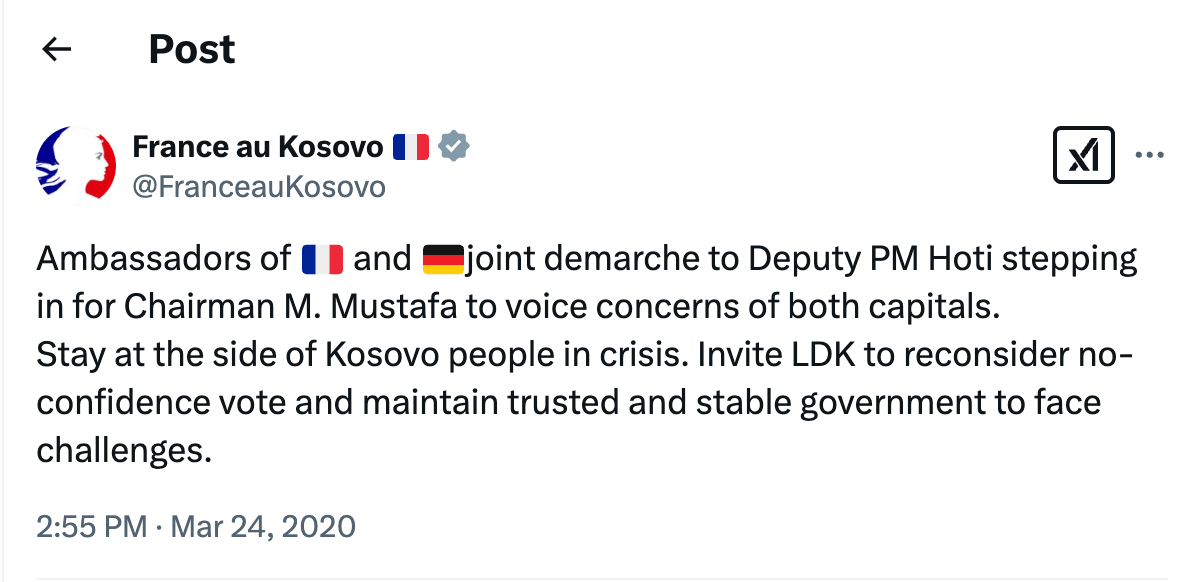
Now, in 2025, Grenell employs a strikingly similar tactic. On February 3, he tweeted3 that the international community is “united against Kurti” and accused Kosovo’s leader of destabilising the region, a narrative immediately amplified by Donald Trump Jr. and certain media outlets in Kosovo, including KOHA Ditore4. The implication is clear: Grenell is once again attempting to shape Kosovo’s political landscape through misinformation, leveraging his media influence to delegitimise Kurti’s government.
The latest revelation of Berat Buzhala’s WhatsApp messages, accidentally exposed during a live broadcast, provides direct evidence of his close coordination with Richard Grenell. In these leaked messages, Buzhala confirms that Grenell personally retweeted his misleading post about Kosovo’s election results, falsely asserting that Kurti had suffered a dramatic loss. This confirms that Grenell is not merely an external commentator but an active participant in shaping the political narrative to destabilize Kurti’s government. This manipulation of election discourse mirrors his previous tactics in 2020, further indicating that Grenell is once again orchestrating a political coup in Kosovo. However, this time, international sources suggest an even more insidious dimension: Grenell’s involvement appears aligned with the interests of Serbia and a joint enterprise of organised crime networks operating within Kosovo. According to well-informed security sources, the assassination plot against Kurti, exposed in a February 1 investigative report5, has been successfully foiled, forcing those behind it to shift tactics. Now, instead of physical elimination, they are attempting to undermine Kurti through a coordinated campaign of electoral deception, foreign interference, and media manipulation. The collusion between Grenell, Serbian-backed networks, and elements of Kosovo’s corrupted elite indicates a second attempted coup, one that blends disinformation with backdoor political manoeuvring.
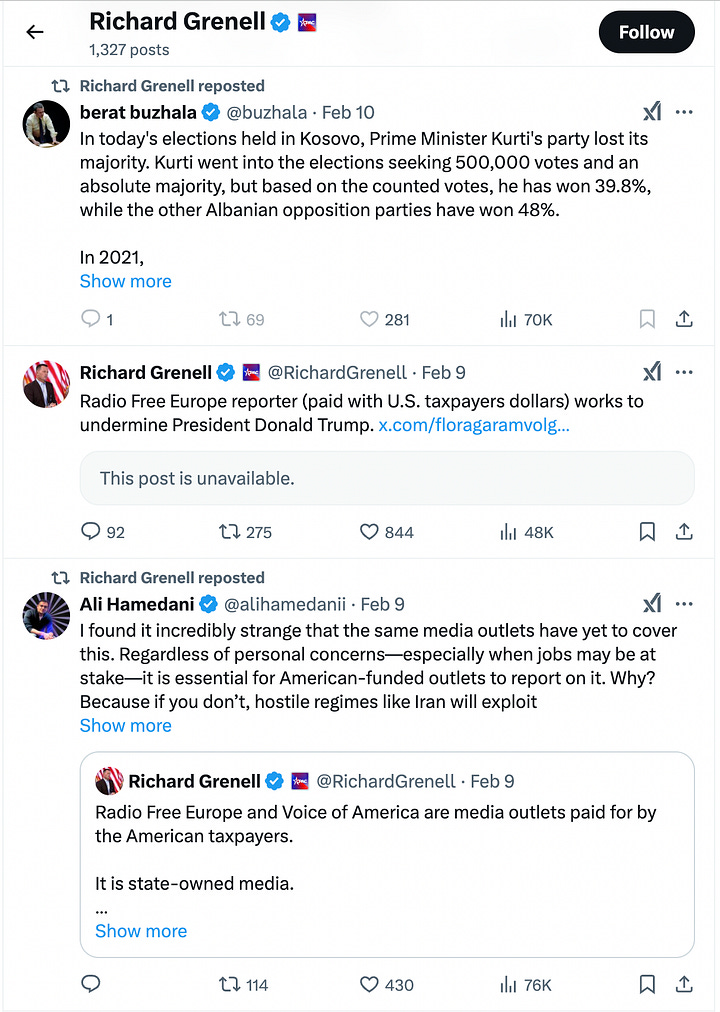
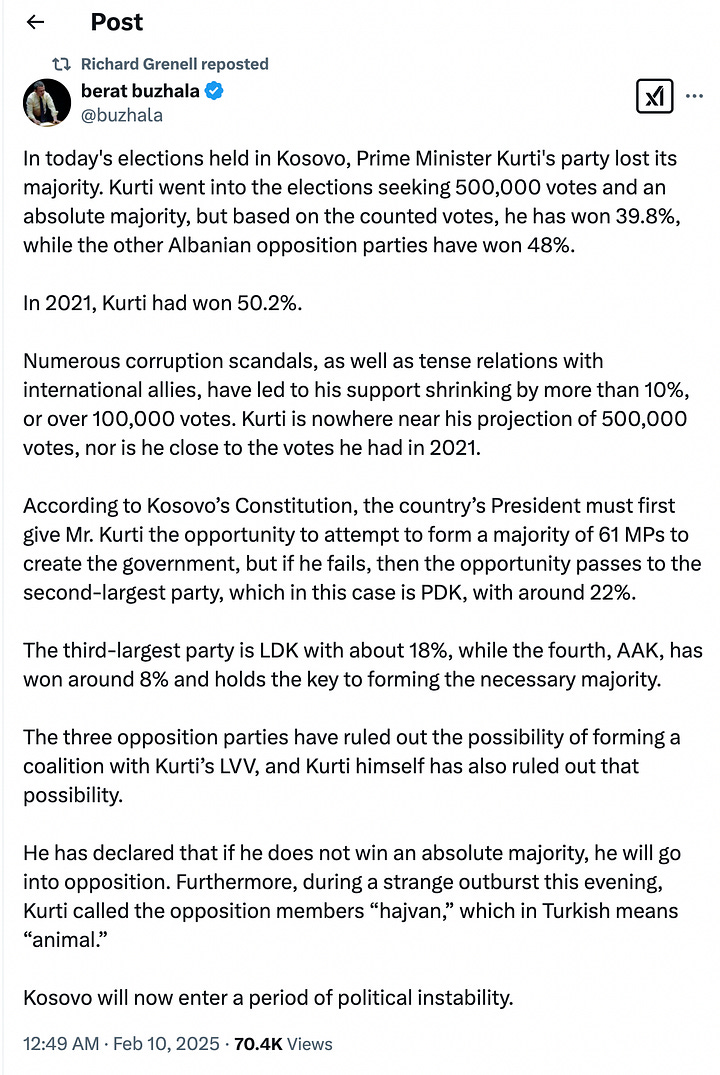
Video below: Shows Buzhala’s WhatsApp messages revealing his direct link to Richard Grenell. Buzhala reveals to Petrit Selimi that Richard Grenell retweeted his post without prior notice, implying that many others were coordinated when Buzhala attacked Albin Kurti and his party, Vetëvendosje.
Kurti’s response to Grenell’s latest attacks underscores a broader reality: Kosovo’s relations with the United States remain robust, despite Grenell’s claims to the contrary. In an interview on February 6, Kurti dismissed Grenell’s assertions6, emphasising that U.S.-Kosovo ties are stronger than ever, particularly in areas of security and energy cooperation. His remarks stand in direct contrast to Grenell’s framing, which relies on selective interpretations and political rhetoric rather than substantive diplomatic shifts. Grenell’s subsequent rebuttal on X7, calling Kurti “delusional” and falsely asserting that Kosovo’s international standing has deteriorated, further reveals his reliance on disinformation tactics rather than factual engagement.
Grenell’s latest interference in Kosovo’s election campaign follows a familiar script. As Frankfurter Allgemeine Zeitung (FAZ) reported8 on February 6, he actively sought to undermine Kurti ahead of the February 9 election, branding him “untrustworthy” and falsely claiming that “the international community is united against Kurti.” His remarks, eagerly amplified by Kosovo’s media, signal a calculated effort to sway the electorate just as he did in 2021. FAZ underscores how Kosovo’s deeply ingrained pro-American sentiment makes its political landscape particularly susceptible to figures like Grenell, who leverage U.S. credibility while serving their own geopolitical interests. His latest intervention is not just about political rivalry, it’s an orchestrated attempt to manipulate Kosovo’s democracy once again.
However, Grenell’s credibility has suffered significant blows since his last major intervention in Kosovo. In 2023, his security clearance was revoked, according to well-informed sources in Washington, D.C., who spoke to me. Although, I have not managed to independently verify the source’s confirmation. However, the same sources stated that Grenell lost the opportunity to be nominated for Secretary of State due to the revocation of his security clearance.
Investigative reports from The Frontliner Magazine, Der Spiegel, ProPublica, and The Washington Post have exposed Grenell’s financial entanglements with Russian-backed operatives. Among the most damning revelations was his connection to Vladimir Plahotniuc, a Moldovan oligarch sanctioned by the U.S. government. Plahotniuc, acting on behalf of Russian interests, sought to overthrow Moldova’s pro-Western government, a scheme in which Grenell is believed to have played a facilitating role.
A ProPublica investigation9 revealed that Grenell had undisclosed financial ties to Plahotniuc10 and had published multiple op-eds in 2016 defending the oligarch without disclosing his paid consulting work on his behalf. Grenell failed to register under the Foreign Agents Registration Act (FARA), the same law that led to the convictions of Trump’s former campaign chairman, Paul Manafort, and his deputy, Rick Gates. Experts cited in ProPublica’s report argued that Grenell's failure to disclose his foreign advocacy work should have disqualified him from obtaining a security clearance. According to national security lawyer Kel McClanahan, “That’s really easy, he should not have a clearance. If he were one of my clients and just a normal [federal employee], he would almost assuredly not have a clearance.”
Similarly, The Washington Post reported11 that Grenell’s paid consulting work extended beyond Moldova. His firm, Capitol Media Partners, was contracted by the Magyar Foundation, a U.S.-based nonprofit almost entirely funded by the Hungarian government under Prime Minister Viktor Orban. According to federal tax filings, Grenell’s company received $103,750 from the Magyar Foundation for media outreach and public relations services in 2016. Legal experts argued that this work raised potential FARA violations, as Hungary has been known to use U.S.-based entities to advance its foreign policy interests in Washington. While Grenell did not register under FARA, attorneys specialising in the law suggested that the Justice Department would have ample reason to investigate whether he should have.
According to the German Council on Foreign Relations, the Magyar Foundation is a Kremlin-linked entity12 strategically funnelling funds into European political structures to undermine democratic processes13.
Grenell’s ties to Russian-backed political movements in Europe extend beyond Moldova. In 2022, German intelligence discovered that he had engaged with the far-right Alternative für Deutschland (AfD) party, a political entity with well-documented financial and strategic connections to Moscow and Beijing14. His involvement was deemed so severe that he was expelled from Germany before his diplomatic tenure concluded. Prior to this, Deutsche Welle (DW) reported15 that German politicians were calling for his expulsion, stating, "German politicians want to expel US ambassador Grenell." Later, in June 2020, DW reported16 his resignation with the headline, "US Ambassador to Germany Richard Grenell resigns."
These revelations not only cost him his security clearance but also any legitimate standing in U.S. national security circles. By 2024, he had been relegated to a marginal position in the Trump administration as President’s Special Envoy for Venezuela and North Korea, a role conspicuously devoid of influence in European affairs.
Grenell’s latest appointment by Trump further underscores his shift from diplomacy to ideological enforcement. According to Der Spiegel17, Trump has now tasked Grenell with leading the Kennedy Center, one of Washington’s most prominent cultural institutions. His mandate? To eliminate what Trump calls “anti-American propaganda,” including drag performances and other progressive programming. This move reflects not just Trump’s deepening culture war but also Grenell’s ongoing transformation into a political operative whose role extends beyond foreign policy into domestic ideological battles. His reassignment from international envoy to the enforcer of cultural conservatism signals a broader strategy: using state institutions to promote a nationalist agenda while sidelining independent voices—whether in Kosovo, Germany, or within the U.S. cultural sphere.
Despite his diminished official status, Grenell continues to exert influence through backchannels, media manipulation, and strategic alliances with nationalist forces in the Balkans. His recent attacks on Kurti18 are not merely personal grievances but part of a broader effort to destabilise Kosovo, a state whose sovereignty remains an impediment to Serbian and Russian geopolitical ambitions. Sources indicate that Grenell has been involved in attempts to undermine judicial institutions across Europe, particularly those tasked with investigating corruption and foreign interference. His sustained engagement in Kosovo, despite having no official U.S. government mandate, raises serious questions about the extent of his unofficial operations and their funding sources.
The European Parliament’s 2021 report provides a framework for understanding Grenell’s current manoeuvres. It detailed how disinformation in Kosovo is often propagated through selective amplification of statements made by Serbian politicians or media outlets, a pattern mirrored in Grenell’s recent claims. By portraying his personal opinions as representative of the “international community,” Grenell not only distorts reality but also fuels internal political divisions within Kosovo. The fact that KOHA Ditore and other media outlets unquestioningly parroted his narrative19 demonstrates the lingering vulnerability of Kosovo’s media landscape to external manipulation.
Grenell’s track record should serve as a warning. His diplomatic career has been characterised by opportunism, alliances with authoritarian figures, and a willingness to deploy disinformation to achieve political ends. The fact that he remains active in Balkan affairs, despite his tainted history and lack of an official role, underscores the persistence of external attempts to subvert Kosovo’s democratic trajectory. As history has shown, Grenell’s interventions are not guided by a genuine interest in peace or stability but by personal and ideological alignments that serve the interests of specific nationalist and authoritarian actors.
Grenell’s trajectory from diplomatic provocateur to enforcer of ideological conformity, illustrates the dangerous intersection of political influence, media manipulation, and nationalist agendas. His continued presence in Kosovo’s political discourse, despite his official irrelevance, underscores the power of disinformation in shaping fragile democracies. Whether in Washington’s cultural institutions or the Balkans’ geopolitical chessboard, his interventions are less about policy and more about consolidating control through narrative warfare. Kosovo, like any democracy under pressure, must confront the challenge not only of external interference but of the insidious reshaping of reality itself. The test is not merely resisting Grenell’s provocations, but ensuring that truth, not manufactured crisis, defines its political future.
Support Independent Journalism
If you value fearless investigative reporting, consider supporting our work through donations or a paid subscription. Your contribution helps ensure that stories like these reach the public, unfiltered and untwisted.
☑ Donate | ☑ Subscribe | ☑ Share This Report |
Kosovo’s Political Mafia: Will They Stop at Nothing to Take Down Albin Kurti?
Since 2021, Kosovo has experienced a significant political shift following the landslide victory of Prime Minister Albin Kurti and his administration. This electoral upheaval ended two decades of governance by political parties widely associated with corruption and organised crime. A cornerstone of Kurti’s leadership has been the push for anti-corruption reforms, particularly legislation targeting unjustified wealth among political elites
The Guardian (2020), ‘Kosovan acting PM accuses Trump envoy of meddling’, 20 April (https://www.theguardian.com/world/2020/apr/20/kosovan-acting-pm-accuses-trump-envoy-of-meddling).
France au Kosovo (2020), ‘Ambassadors of [FR] and [DE] joint demarche to Deputy PM Hoti stepping in for Chairman M. Mustafa to voice concerns of both capitals. Stay at the side of Kosovo people in crisis. Invite LDK to reconsider no-confidence vote and maintain trusted and stable government to face challenges.’ (https://twitter.com/franceaukosovo/status/1242465150134878213?lang=en).
Richrd Grenell’s Feb 3 2025 Post (https://x.com/RichardGrenell/status/1886418809629884697)
Bashkësia ndërkombëtare, e bashkuar kundër Kurtit” - Djali i Trumpit shpërndan postimin e Grenellit — (https://www.koha.net/arberi/bashkesia-nderkombetare-e-bashkuar-kunder-kurtit-djali-i-trumpit-shperndan-postimin-e-grenellit)
Albin Kurti Responds to Grenell: Kosovo-U.S. Relations Are Stronger Than Ever — Euro News (https://euronews.al/en/albin-kurti-responds-to-grenell-kosovo-u-s-relations-are-stronger-than-ever/)
“Delusional” responded Rchard Grenell on X (https://x.com/RichardGrenell/status/1887692571507650638)
Trumps Gesandter empfiehlt die Abwahl der Regierung — FAZ (https://www.faz.net/aktuell/politik/ausland/kosovo-donald-trumps-gesandter-ruft-zur-abwahl-des-regierungchefs-auf-110277279.html)
Richard Grenell did not disclose payments for advocacy work on behalf of a Moldovan politician whom the U.S. later accused of corruption. — ProPublica.
Richard Grenell’s paid consulting included work for U.S. nonprofit funded mostly by Hungary - Washington Post.
The Kremlin’s Influence in Hungary — German Council on Foreign Relations.
Russian influence in Hungary — EU Parliament Report.
China, Russland und die AfD Alternative gegen Deutschland — Der Spiegel (https://www.spiegel.de/politik/deutschland/afd-spionageaffaere-russland-und-china-im-fokus-neue-enthuellungen-belasten-die-partei-a-46042b96-2d61-4bb4-ac25-ead57d7d6285)
German politicians want to expel US ambassador Grenell | DW News
US Ambassador to Germany Richard Grenell resigns — DW (https://www.dw.com/en/us-ambassador-to-germany-richard-grenell-resigns/a-53659927)
Grenell soll für Trump jetzt das »Showgeschäft« dirigieren — Der Spiegel (https://www.spiegel.de/kultur/richard-grenell-soll-fuer-donald-trump-jetzt-das-showgeschaeft-dirigieren-a-39e08e10-54a8-4fbf-901c-a5b744a3718c)
Trumps Gesandter empfiehlt die Abwahl der Regierung — FAZ (https://www.faz.net/aktuell/politik/ausland/kosovo-donald-trumps-gesandter-ruft-zur-abwahl-des-regierungchefs-auf-110277279.html)


